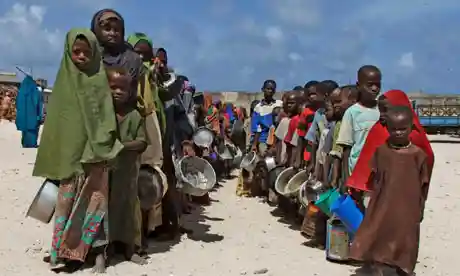
Somali regions from north to south and east to west are struggling with severe drought characterized by lack of rain, low rivers and declining pastures. So far, the disaster has displaced up to 200,000 Somalis seeking humanitarian assistance in other areas.
According to the UN Office for the Coordination of Humanitarian Affairs (OCHA), has estimated that by the end of this month roughly 4 millions Somalis will face “acute food insecurity”. This number will rise to 5 millions by May. Overall, up to 8 millions of people would need humanitarian assistance and protection this year.
The UN Humanitarian Emergency Response has allocated 8 millions of dollars for relief assistance at the end of 2021. Now relief organizations are seeking $1.5 billion through the Humanitarian Response Plan (HRP) for Somalia to assist the most vulnerable.
Whether due to climate change – a relatively new concept – seasonal drought that has occurred since time immemorial or other man-made causes, Somalia has been grappling with this type of drought for three decades. But according to figures put forward by humanitarian organizations, this drought would be the hardest hit by Somalia for 41 years.
All Somali regions are hit by the drought but the most affected are surprisingly regions bordered by the Juba and Shabelle rivers. There were once wetland, irrigated fields and forests. The region highly affected were the “bread basket of Somalia”.
Leaders’ Response
Another drought in Somalia and the government is unable to come up with a meaningful response to alleviate the suffering of thousand of starve and thirsty individuals, and thousands of displaced who lost their livestock dying on dusty roads or left their livelihood to find help.
Early last year, the government set up a relief task force of ministers to respond to the dire situation of the most affected regions. This disaster relief committee has yet to share with the public its work to alleviate the humanitarian needs of affected populations.
However, with politics being very divisive in Somalia, real solutions are yet to come for these poor people in need of urgent assistance. For now, they are on their own while the politicians settle their dispute.
In November, President Mohamed Abdullahi Farmajo donated two months’ salary. The President also urged other government officials to donate 10% of their salaries. Since then, nothing came out of how much has been collected and what has been done. Headlines were occupied with the election crisis.
Then the news Prime Minister Mohamed Hussein Roble was caught in embezzlement case came as a slap on the face of the drought-displaced Somalis. The Humanitarian Affairs Ministry is also being investigated for corruption.
In this environment, the people affected by the drought expects little from leaders busy collecting public land, embezzling humanitarian aid or enriching themselves while they still can.
In the meantime, UN staff and other NGOS are busy raising the issue for potential donors contribute the Somalia Humanitarian Fund locally administered by foreigners. They also use this leadership vacuum to keep Somalia on a leash for years to come.
Drought Profiteering
The past few days, Somalia witnessed yet again politicians scrambling to use humanitarian aid for personal gain. While we have not information about a flow of aid being diverted similar to what happened after the 2011 drought, delivery of food supplies have been used by politicians in this time of elections.
Last week, Prime Minister Roble took advantage of the United Arab Emirates food package delivery he personally welcomed at the Aden Adde Airport in Mogadishu to attack Somalia’s stance toward that country for the last four years.
He similarly requested to have access to money seized from an Emirati private jet on April 2018. His apologies for the smuggling of illegal money seizure have irked many.
The former Foreign Affairs minister, Mohamed Abdirizak, sacked on November, also joined the fray and accused the government, whose policies he defended for years, to politicize aid coming from Egypt in order to appease Ethiopia.
President Farmajo himself, during a public address highlighting his achievements for the last 4 years and half, did not use this widely followed speech to mention the drought and his consequences on the country in spite of his earlier generous donation.
For his part, the President of Jubaland, Ahmed Madobe, whose region he is supposed to lead is experiencing the worst drought, met with the Emirati ambassador in Mogadishu to discuss the transport of more than 250,000 bags of charcoal stranded in the port of Kismayo.
All of these politicians, except Madobe, are planning to be elected in this ongoing election and none of them raised the plight of the people fleeing drought-affected areas and in need of relief.
Unfortunately, at a time like this when Somalia is facing severe drought as well as the pandemic, leadership is badly needed and it cannot wait for elections to be finalized.
